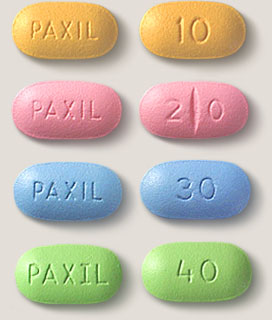A research team from the City of Hope in Duarte has found a possible link between the antidepressant medication Paxil (paroxetine) and Breast Cancer they say.
The team has developed a quick way to identify drugs and chemicals that have the ability to disrupt the balance of sex hormones in human beings, influencing and progressing such diseases as Breast Cancer.
In a trial screening of 446 drugs that are currently in wide circulation, their research singles out the popular antidepressant as having a weak estrogenic effect that could promote the development and growth of breast tumors in women.
What is really important in this study, many women that are being treated for Breast Cancer also suffer from depression, treated with antidepressants such as Paxil. Paxil has been on the market since 1992. According to statistics, almost a full quarter of American women in their 40’s and 50’s are taking an antidepressant in the same class as Paxil. (SSRI)
A high rate of breast cancers in women, about 70%, are sensitive to estrogen, a hormone abundant in women of child bearing age.
The new screening method developed at City of Hope also identified two antifungal medications — biconazole and oxyconazole — as having an anti-estrogenic effect similar to that of medications prescribed to prevent breast cancer and its recurrences in women. Incidental to their intended use in combating fungal infections, those medications inhibit the action of aromatase, an enzyme that converts androgens — hormones more plentiful in males but present in both sexes — into estrogen.
Their screening method also identified bisphenol A — a compound used in the manufacture of plastics and epoxy resins — as an estrogen promoter capable of raising breast cancer risk.
According to the Los Angeles Times, “The discovery that Paxil behaves as an endocrine-disrupting chemical may shed light on growing suspicions about the medication in women who have had breast cancer. A 2010 study found that breast cancer patients in Canada who were taking Paxil were more likely than those taking other antidepressants to die of breast cancer when there was a substantial overlap in their use of that antidepressant and of tamoxifen to prevent breast cancer recurrence.
The researchers surmised that paroxetine, which was taken by about a quarter of the depressed breast cancer patients in the study, might block the production of a liver enzyme needed to metabolize tamoxifen. The authors of the latest research said paroxetine’s “weak estrogenic” effect “may be responsible, in part, for the observed reduction” in tamoxifen’s effectiveness in that study.
The finding that paroxetine has estrogenic effects “has implications for patients with estrogen-sensitive breast cancer who are on other medications,” said Shiuan Chen, professor and chairman of City of Hope’s department of cancer biology and lead author of the study.”


2 Replies to “Possible Link Between Paxil and Breast Cancer Found”